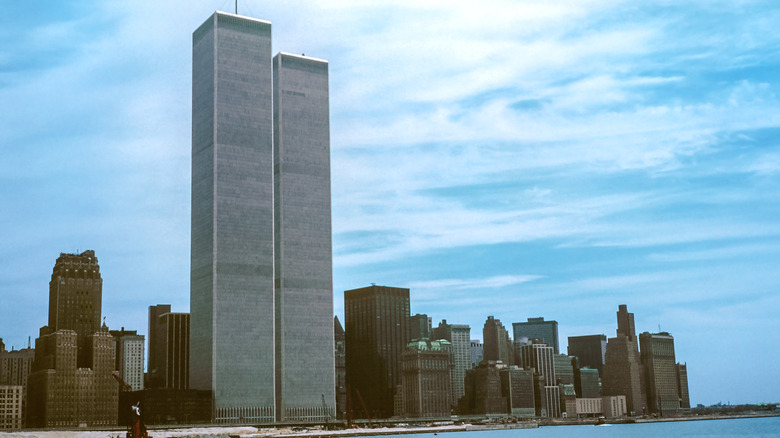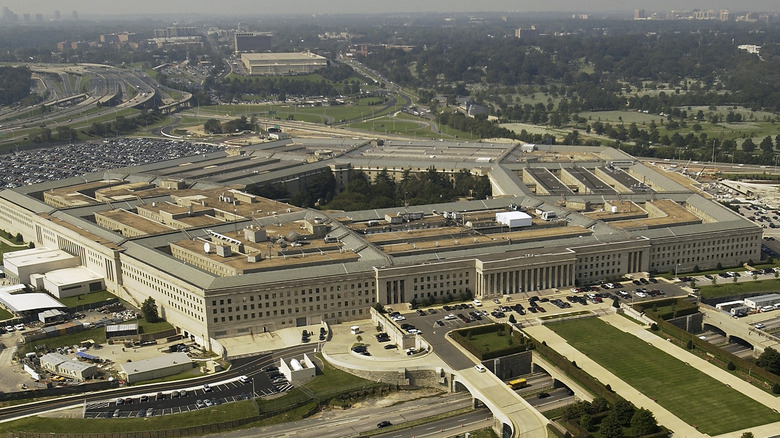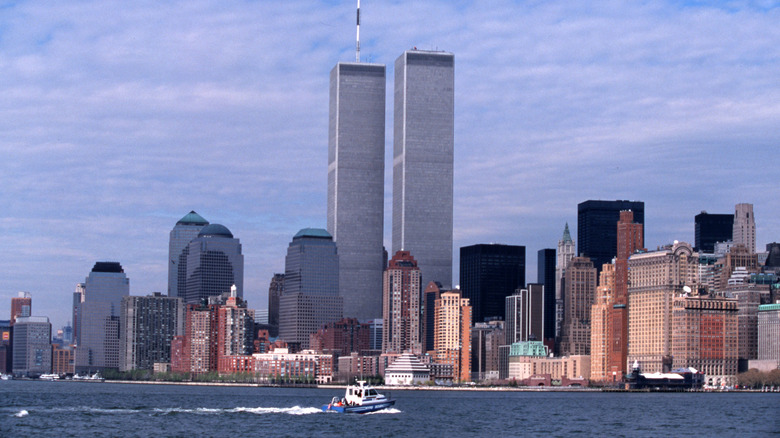Why Were The Twin Towers And Pentagon Targeted On 9/11?
On September 11, 2001, two symbols of American power were attacked. First, two hijacked planes — Flight 11 and Flight 175 — struck the World Trade Center's Twin Towers, causing them to collapse and killing thousands. Later that morning, a third plane, the hijacked Flight 77, hit the Pentagon in D.C., killing all aboard and 125 others in the building. In the minds of the terrorists involved, the Lower Manhattan Twin Towers represented Western economic might. Meanwhile, the Pentagon — where the U.S. Armed Forces command is headquartered — stood for Western military dominance. With those two locations taken out, they thought America's impact on the world would be greatly diminished, according to the 9/11 Memorial Museum.
In 2004, Al-Qaeda leader Osama bin Laden affirmed his group's responsibility for the deadliest terrorist attack in history, the CBC reported that year. In his video message, bin Laden said his organization sought to "destroy towers in America" because "we are a free people ... and we want to regain the freedom of our nation." Also on September 11, passengers and crew fought back against one other hijacking, and a fourth plane, Flight 93, crashed into a field in Pennsylvania near D.C., killing everyone on board, according to the University of Virginia's Miller Center.
Decades later, Flight 93's final destination remains uncertain — possibly the U.S. capitol — butthe Pentagon and the Trade Center were clear objectives that day. By 2002, the Pentagon was rebuilt, and since 2011, the 9/11 Memorial & Museum has stood where the Twin Towers were once located.
al-Qaeda had no military of its own
Crucial to understanding what motivated the 9/11 attacks on the Pentagon in particular is the fact al-Qaeda had no military strength of its own. U.S. officials learned in 1996 that al-Qaeda, led by Osama bin Laden, had secretly declared war on the U.S., according to the FBI. But with no formal military backing, the Islamic fundamentalist terrorist umbrella group turned to bombings and other kinds of attacks on international U.S. targets throughout the 1990s. Though not officially an army, al-Qaeda members were well-trained, and over time, the sophistication of their operations escalated, per the 9/11 Commission Report.
Per the report, "The 9/11 attacks on the World Trade Center and the Pentagon were far more elaborate, precise, and destructive than any of these earlier assaults." And by September 2001, the report said, "The executive branch of the U.S. government, the Congress, the news media, and the American public had received clear warning that Islamist terrorists meant to kill Americans in high numbers." According to a 2023 report from the Wilson Center, al-Qaeda was still active, though U.S. Navy Seals shot and killed bin Laden in Pakistan in 2011. And in 2022, a U.S. airstrike killed bin Laden's successor, Ayman al-Zawahiri, The Washington Post reported that year.
The 1993 Twin Towers attack
9/11 was not the first time the World Trade Center was targeted. On February 23, 1993 a bomb exploded in its parking garage, killing six and injuring over 1,000, according to the FBI. Six Islamic fundamentalists not directly affiliated with Al-Qaeda were later arrested for the crime. Meanwhile, a seventh suspect remains at large. With that attack, though, American officials were alerted to the Twin Towers' strategic importance for international terrorists on American soil.
The James Martin Center for Nonproliferation Studies says in 1993, the towers were attacked not so much for symbolic value but to instill shock and to inflict the maximum number of casualties. One convicted '93 bomber, El-Sayid Nosair, wrote that any strike against the U.S. should "demoralize the enemies of Allah ... by destroying and blowing up the pillars of their civilization and blowing up the tourist attractions they are so proud of and the high buildings there are so proud of."
No one could have imagined how the next horrific terrorist attacks would play out on 9/11. But according to PBS NewsHour, safety precautions instituted after the 1993 Trade Center bombing — such as improved evacuation protocols and enhanced emergency lighting — helped save lives that day. Speaking in 2023 on the 30th anniversary of the '93 attack, Andrew Colabella, a relative of one earlier World Trade Center bombing victim, said, "The '93 World Trade Center bombing was the powder keg for the 9/11 attacks. These two historical events that have taken place should be instilled in our hearts and minds, to think united and to be united."


